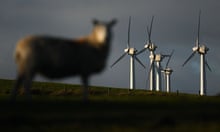The government is planning to launch its revamped net zero strategy from the UK’s oil and gas capital, Aberdeen, in a clear signal of its intention to boost the fossil fuel industry while cutting key green measures, the Guardian has learned.
Next week’s launch was originally called “green day” in Whitehall, but has been rebranded as “energy security day” and will focus on infrastructure. Campaigners have called the move a travesty.
Plans to extend offshore drilling for oil and gas will be cited as necessary to keep the lights on, and justified by investment in nascent carbon capture and storage (CCS) technology, which is as yet untested at scale.
The revamped net zero plans, including a green growth strategy, will contain major sops to the UK’s fossil fuel industries and will miss out on key green measures. The Guardian has learned that the plans, still under wraps before Thursday’s launch, will include the following:
Ministers will refuse to force oil and gas companies to stop flaring by 2025, as recommended in the review of net zero by Chris Skidmore earlier this year.
Ofgem will not gain important powers to include the net zero target in its regulation of the energy sector, effectively defanging the regulator.
No overarching new office for net zero, as recommended in the Skidmore review.
No compulsion on housebuilders to fit rooftop solar to new housing.
No comprehensive nationwide programme for insulation of the UK’s draughty housing stock, as green groups have been calling for. Instead, the strongest insulation measure is likely to be a consultation on the private rented sector.
The Treasury, the Department for Energy Security and Net Zero, and the Department for Business and Trade are at war over whether to introduce carbon border taxes.
Major roles for carbon capture and storage technology and hydrogen, which could boost the oil and gas industry with questionable gains for the environment.
The potential licensing of a massive new oilfield, Rosebank, under cover of investing in carbon capture and storage technology, which campaigners warn is “greenwash”.
Green experts and campaigners were “astounded” at the rebranding of what had been widely trailed as “green day”, and by the plans to unveil it in Aberdeen, the centre of the UK’s oil and gas industry.
Tom Burke, a co-founder of the E3G thinktank, said: “This is Fawlty Towers politics – don’t mention the environment! It’s a sop to the right wing. It’s clear this is not a strategy, just an assembly of lobby interests.”
He said the UK economy would suffer. “The real problem for the UK is that the US, with the Inflation Reduction Act, and the EU have started the race for a green economy. That race has gone off and we are not in the race. Green day was supposed to be an opportunity to get back in the green race, but this is just supporting [fossil fuel] lobbies.”
A last-minute change of venue is still possible, though Aberdeen is the favoured option, and rows are ongoing over whether the prime minister, Rishi Sunak, will lead the launch.
The launch next week will include several key elements and involve at least four government departments. Ministers are compelled to publish a revamped net zero strategy by the end of this month, after Friends of the Earth and other campaigners won a court case last year that found the previous strategy inadequate.
Green measures in the strategy are likely to include an expansion of renewable energy, includingoffshore and onshore wind – the latter currently in effect banned in England – and it will also include plans to produce green hydrogen. Electric vehicle manufacturing will be a focus, with the potential for a mandate requiring companies to sell more of them, as will heat pumps.
Ministers will also respond to each of the 130 recommendations of the net zero review, conducted by the Tory MP Chris Skidmore, and will publish a 70-page green growth strategy, and a green finance strategy from the Treasury. The Department for Environment, Food and Rural Affairs will also make fresh commitments on the UK’s carbon footprint.
While the government sets out its energy security strategy, a decision on a licence for the massive new Rosebank oilfield has reached the desk of Grant Shapps, the energy secretary, the Guardian has learned. If it goes ahead, new estimates by the campaign group Uplift show that Rosebank, expected to cost £4.1bn to develop, could receive an effective taxpayer subsidy worth £3.75bn through tax breaks and the loophole in the government’s windfall tax that spares oil and gas investment.
This would mean that Equinor, the Norwegian state-owned company behind the potential field, would pay only £350m to develop Rosebank, which is three times the size of the Cambo oilfield. Equinor made £62bn last year, and about 80% of the oil from Rosebank is likely to be exported, rather than bolstering the UK’s energy security.
after newsletter promotion
A spokesperson for Equinor said the company did not recognise the Uplift estimate, and cited a separate industry report that found the Rosebank project could bring £26.8bn to the UK through tax payments and investments into the UK economy. The spokesperson said: “Rosebank has the potential to strengthen energy security with oil and gas that is produced with a much lower carbon footprint than current UK production.”
Tessa Khan, the executive director of Uplift, said: “Approving Rosebank would be an unbelievably bad deal for Britain. UK taxpayers would effectively cover almost all the costs of developing Rosebank by giving Equinor billions in tax breaks. The oil would most likely be exported, and Norway would take the profit.”
Ed Miliband, the shadow climate change and net zero secretary, said: “The Conservatives’ latest energy relaunch is daylight robbery, a colossal waste of taxpayers money, and climate vandalism on an epic scale. Funnelling billions from the British people to foreign-owned oil and gas companies already making record profits is one of the worst deals in British history and an insult to millions facing the cost of living crisis.”
The potential Rosebank decision and the energy security launch proposals come after climate scientists issued their “final warning” this week that the world would breach the crucial threshold of 1.5C of global heating without urgent action. The UN secretary general, António Guterres, called for an end to new oil and gas development in response.
Relying on CCS technology to bring down emissions was “greenwash” and would benefit the oil and gas industry, said Greenpeace. “Carbon capture is not zero carbon; is unlikely to see dramatic cost reductions or be scalable; and is often used for greenwashing by oil and gas companies so they can carry on polluting. It doesn’t do what it says on the tin and certainly should not be prioritised as part of a green industrial strategy.”
Chris Venables, of the Green Alliance thinktank, said: “There can be no energy security while the UK remains dangerously reliant on volatile global oil and gas markets. A real plan to bring down eye-watering energy bills by protecting the public from expensive fossil fuels must have renewable energy at its heart. Luckily, the government has a whole range of incredibly simple tools at its disposal to speed up the rollout of cheap, clean power. If those remain collecting dust on the shelf next week, it will be almost impossible for industry and business, never mind environmentalists and fuel poverty groups, to take this new plan seriously at all.”
The Guardian has approached the Department for Energy Security and Net Zero for comment.










